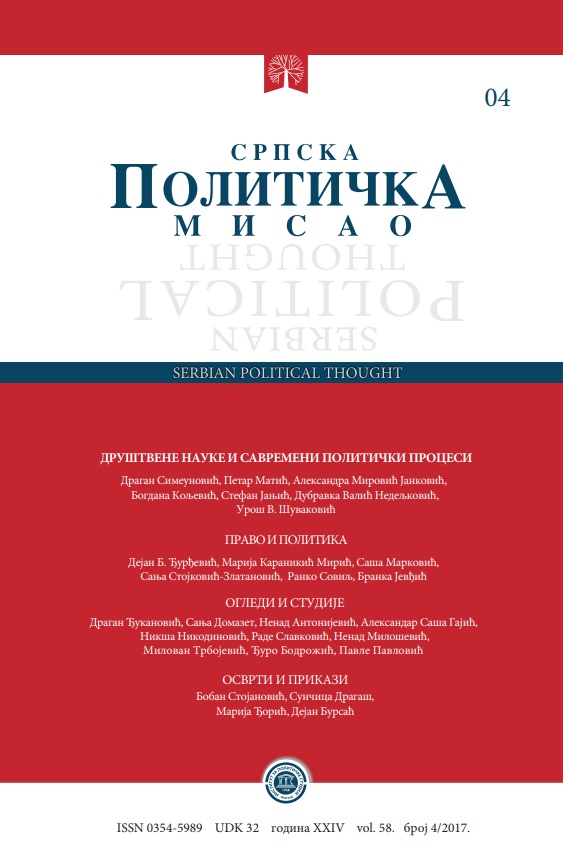Могућности и ограничења најављеног „српско-бошњачког дијалога“
Opportunities and Limitations of the Announced “Serbian-Bosniak Dialogue”
Author(s): Dragan ĐukanovićSubject(s): Inter-Ethnic Relations
Published by: Институт за политичке студије
Keywords: Serbs; Bosniaks; dialogue; Serbia; Bosnia and Herzegovina
Summary/Abstract: Since the beginning of 2014, political elites in the Republic of Serbia and Bosnia and Herzegovina have been announcing the broadest Serbian-Bosniak/Bosniak-Serbian dialogue. However, even three years later, the dialogue did not take place. This dialogue would imply the participation of political, but also other structures of the two countries, as well as the two peoples (religious communities, the academic community, non-governmental sector, etc.). However, the general frameworks and principles of this dialogue have not yet been conceived. In any case, they should be based on the universal values (e.g. dedication to peace, mutual respect, respect for national identity, affirmation of cohabitation, etc.), but also European standards. Along with the mentioned problems in relations between the Serbian and Bosniak people, the bilateral relations between Bosnia and Herzegovina and the Republic of Serbia have also not been improved. They are still dominantly linked to a number of open questions, mostly determined by the breakup of the former Socialist Federal Republic of Yugoslavia and the war in Bosnia and Herzegovina (1992-1995). The Bosniaks and the Serbs, as two South Slavic peoples in the west of the Balkans, are fairly depending on each other bearing in mind the ethnic composition of this region. They live together in a large part of Bosnia and Herzegovina, as well as in Serbia and Montenegro (Sandzak), in Kosovo and in Macedonia. In that sense, the improvement of relations between political, religious, academic and other Serbian and Bosniak structures would contribute to a certain degree in overcoming the extremely bad heritage of armed conflicts on the territory of Bosnia and Herzegovina, as well as some incidents in Sandzak, during the period 1992-1995 (Štrpci, Sjeverin, Bukovica, etc.). The above-mentioned dialogue should be conducted on two levels – between the authorities in Belgrade and Sarajevo, and also between the representatives of Serbs and Bosniaks from Bosnia and Herzegovina, as well as from Serbia (Sandzak). On the other hand, given the complexity of the structure of Bosnia and Herzegovina and the relations between Bosniak and Serbian ethnoelites in this country, the rapid success of the announced initiative is unlikely. Besides already mentioned, there are problems related to deep discord between the Bosniak political leaders, namely Bakir Izetbegovic (Party of Democratic Action) and Fahrudin Radoncic (Alliance for a Better Future of Bosnia and Herzegovina). In addition, the current leadership of Bosnian Croats could further aggravate the possibility of implementing potential results and agreements that would arise from the Serbian-Bosniak dialogue. The reaction of the influential international actors in the region of the Western Balkans, primarily the United States, the Russian Federation, the Republic of Turkey and the European Union (and in particular the Federal Republic of Germany) to the beginning and the range of the announced Serbian-Bosniak dialogue would be particularly indicative. In this regard, there are significant disagreements between the administration of these very important actors of the regional and world politics, from the support shown by the Federal Republic of Germany, the European Union and the United States, to the potentially less constructive role of Turkey and the Russian Federation.
Journal: Српска политичка мисао
- Issue Year: 2017
- Issue No: 4
- Page Range: 215-230
- Page Count: 16
- Language: Serbian

